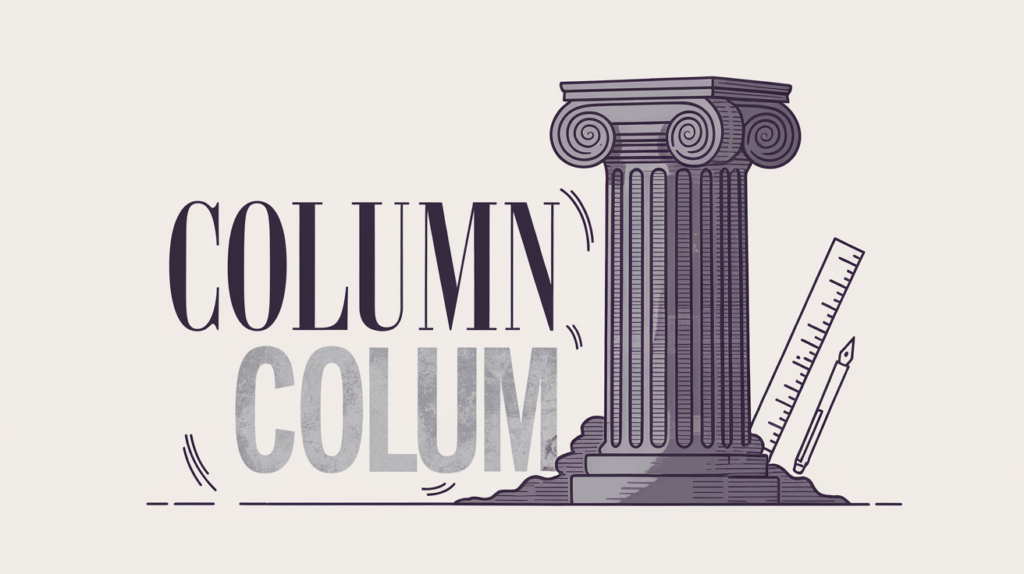Ever stared at your screen, fingers hovering over the keyboard, wondering if it’s colum or column?
You’re not alone in this spelling struggle. Many writers freeze up when they encounter this word, second-guessing themselves and losing precious time.
It’s frustrating when something so simple trips you up, especially when you’re trying to focus on getting your message across. The uncertainty can make even confident writers feel foolish.
There’s actually a simple way to remember the correct spelling forever, and it involves thinking about what columns actually do.
Is the Correct Spelling Colum or Column?
The correct spelling is column with an “n” at the end. “Colum” without the “n” is incorrect in English.
This confusion happens because people often drop letters when speaking quickly. They might say “colum” in conversation, but the written form always needs that final “n.” It’s similar to how some folks say “libary” instead of “library”; the spoken shortcut doesn’t match the proper spelling.
The word comes from the Latin “columna,” which explains why the “n” remains unchanged. English kept the original Latin spelling structure, so the “n” isn’t optional.
Every time someone writes about architecture, spreadsheets, or newspaper layouts, they need to use “column” with the “n.”
What does “Column” Mean?
A column refers to several different things depending on the context.
In buildings, it’s a tall, vertical support structure. You see these holding up roofs or decorations on old buildings and modern homes.
In newspapers and magazines, it’s a section of text that runs from top to bottom on a page. Writers often have their own columns where they share opinions.
In spreadsheets, it’s a vertical line of cells that extends from top to bottom. Each column has letters like A, B, or C at the top.
You can also use it for any vertical arrangement of items or people standing in a line.
Why do People Misspell “Column”?
Several factors contribute to the common colum or column spelling confusion that many writers face.
Pronunciation plays a major role
When people speak quickly, they often don’t clearly pronounce the final “n” sound. This makes “column” sound like “colum” in everyday conversation. The brain then stores this shortened version, leading to spelling mistakes later.
Silent letters cause trouble, too
The “n” in “column” isn’t always emphasized when spoken, making it easy to forget during writing. Many people assume that if they can’t hear a letter clearly, it might not belong in the spelling.
Similar word patterns create confusion
Words like “album” and “datum” end without an “n,” so writers sometimes apply the same pattern to “column” incorrectly.
Typing speed contributes to errors
Fast typists occasionally skip the final “n” without noticing, especially when their fingers are moving quickly across the keyboard.
How to Remember the Correct Spelling
Here are a few tips that can help you remember the correct spelling:
| Trick | Memory Aid |
|---|---|
| Building Support Trick | Real columns hold up structures. The “n” makes the word solid—without it, the word (and the building!) would collapse. |
| News Column Reminder | Newspapers use columns to organize complete, accurate info. A “colum” would be incomplete, just like news without the final “n.” |
| Row and Column Connection | Columns and rows are a team. Both end in strong consonant sounds, helping your brain link them as a pair. |
| Rhyming Sentence | Use this fun rhyme: “The tall column made me yawn.” The shared “n” sound helps the spelling stick. |
| Repetition Practice | Write “column” five times. Muscle memory helps your fingers lock in the full, correct spelling. |
Similar Words that can Confuse People
Many other English words create the same spelling confusion as column, where people drop letters they don’t clearly hear. These spelling challenges happen because English pronunciation doesn’t always match spelling.
The key is learning each word’s correct written form, regardless of how it sounds when spoken.
- “Library” vs “Libary” – People often skip the first “r” because it’s not strongly pronounced. The correct spelling always includes both “r”s.
- “February” vs “Febuary” – The first “r” gets dropped in speech, but it stays in writing. Always spell it with both “r”s.
- “Wednesday” vs “Wensday” – The “d” is silent when spoken, making people forget it exists. The spelling keeps the “d” from the original word roots.
- “Sandwich” vs “Sandwhich” – People flip the “w” and “h” because that’s how it sounds. The correct order is “dw,” not “wh.”
- “Definitely” vs “Definately” – This one trips up millions of writers. It contains “finite,” not “nate.”
- “Separate” vs “Seperate” – Remember there’s “a rat” in “separate” to get the middle vowel right.
Final Thoughts
Now you know the answer to the colum or column question – it’s always “column” with that important final “n.” This spelling rule isn’t just about being correct; it’s about clear communication in your writing.
The next time you’re typing and pause at this word, remember the strong building support trick or the complete news story method.
These memory tools work because they connect the spelling to something meaningful.
What’s your biggest spelling challenge? Do you have other words that make you stop and think twice? Share your experiences in the comments below – chances are, other writers face the same struggles you do.
















